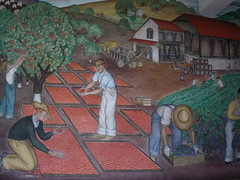One more post on the murals in Coit Tower.
Back in the day, S'mee moved. Our family moved several times when I was a child, sometimes several times in a single year, but there's another post in all of that. One place that seemed to drag us back every so often was a (then) farming community. Potatoes, Alfalfa (at one point, our home was smack in the middle of one of these fields), plenty of Dairies, Turkeys, Chickens and their Eggs, and APRICOTS!
We were all fairly young, too young to be legally employed down at the local fast food. There were few jobs young women could earn wages from. Baby Sitting, Yard and House Work, and working with APRICOTS! The first year we worked the apricots, I was too young to go to camp. I had one more year to age. But my sisters needed to go and there wasn't money enough to spend on such luxuries as girl's camp. So we all got on our bikes and rode out to the fields and began the few summer weeks worth of camp money pitting and laying out fresh picked apricots.
The farm was large, dusty and HOT! We earned $1.00 per flat, which if memory serves correctly was approximately 4' x 12'. (after a day or two it wasn't the dimensions that mattered). The 'cots would arrive in large crates too heavy for us to pick up. They would be stacked near our posts. The people who had worked there for more than a day realized that it was faster to load up your clothes like this gal and then dump all of the collected fruit onto the space available on the flat. We would pick up the fresh and ripe fruit, twist it without bruising it and then place it flesh side up to dry naturally in the sun. The pits would be thrown into large collection barrels a few feet away from the flats in a central location. When your flat was full, you would go get an new one and place it on the one below and start all over raising your work surface 2 1/2 inches at a time until the end of the day.
The faster you accomplished this task the more money you would earn. The key was to become faster and faster each day. I remember by the end of the second summer of doing this job I didn't care about the money anymore I was out of my mind and just began "decorating" the flats in designs of swirled apricots, checkered apricots, perfect angles, lines and geometric shapes, and I remember to this day the last flat I laid out had an apricot tribute to Mickey Mouse.The stench of the farm after the first week was incredible. Fruit that had been mishandled or dropped and forgotten was left to nature and began to rot and ferment in the hot sun and eventually the wet humid fumes of it all were overwhelming to me. We stood by ourselves on cement slabs large enough to accommodate the mesh wrought iron table that was just large enough to hold the flat and just enough room to stand around one side of it. Other than that, it was the fine dusty soil the farm and plant was situated in. Large corrugated metal and wood buildings held the farm equipment and there were the obligatory and miscellaneous towers here and there. The proximity to these metal building provided us with the radiant heat of the reflected sun and the rumbling of the machinery.
Ants came in by the droves and so did any other multi-legged creature looking for a treat. It was a feast for the insect kingdom and you learned not to stand still for too long and how to swat while pitting and not miss a beat!
Large trucks would come in twice a week from a large skin care company and remove all the pits for use in their lotions. (Our hands were nice and soft by the end of summer!) The noise from this process was pretty loud. (Imagine a large garbage truck lifting up and dropping down metal trash cans full of pits and dumping them into the truck over and over until it was full. yowsers!) After the days worked was finished we got backed on our bikes and rode back home, exhausted.
Although this is the end of my story it is not the end of those who began it. Prior to our pitting, someone had to go out to the fields and get the product in the first place. Anyone who has worked in the Church Farming fields knows the enjoyment one gets from dragging the hoses from tree to tree; climbing on wood ladders to thin the fruit blossoms, and hand picking the fruit. Multiply that (usually) one days' free labour of service with friends and family chatting and laughing into your daily piece work job and its' value for putting food on the table and you get a job that will break your body down and take years off your life.
The migrant workers don't have the time to chat in the fields and design Mickey Mouse out of the fruit they collect. They are not allowed to just eat what they want. The restrooms are actually honey pots, a name Thor uses because they attract all manner of vermin. And they are usually located at the corner of the field, which depending on the day could be several acres away. They carry their own water, which is added the their work load. Their noon meal is located near the "honey pots", so you can imagine what has become of it in the heat and exposure. They become the mule who walks from tree to tree and hand carries the baskets in from the field that were too heavy for us to haul ten feet. Most of their work is with their hands over their heads, faces to the sun. Others work for hours with their backs bent over or on their hands and knees.
Imagine receiving a check at the end of the week -pennies per pound of fruit, where it is your word against your employers' as too just how much work you produced. Any arguments and you are threatened with deportation. At the end of your job you are politely asked to go back to Mexico and come back next year, again to do piece work without benefits, pension, or the majority of your family. All of your housing and expenses can be taken from your check prior to your receiving it if you live on the job farm site. Even if you choose to live elsewhere, if you are a migrant worker, you will live in housing that is substandard and over priced. (Cracking floors, infested with mice and roaches so much that any food is destroyed/eaten by the vermin in one day. One toilet and one sink. All this for $1200.00 a month. S'mee lives on 1/2 acre, in a 1500 sf home -3bed/2bath-with all the conveniences of modern society for $800.00 mortgage. The house next door, which is LARGER is rented for $750.00 per month) To manage it, you invite several other workers to share your living space for the season. This means no furniture other than the old mattresses you can find placed directly beside each other on the floor with no room to walk other than on top of the mattress. Your food is stored in bags on the floor because there is no refrigerator. If you do find one to use, your grandmother would have thrown out years ago because it uses so much energy to run it isn't cost effective. Because you speak a language other than your employer's you depend on an interpreter for correct information.
(While in the Central Coast we listened to one NPR program and learned just how un Christ-like some of these farms still are. It doesn't matter to me if you are pro or con on immigration. NO ONE should be living -especially in the U.S.A.- under these conditions of threat, coercion, poverty and filth. Thank you to corporations like Taco Bell for (finally after 4 years!) upgrading the conditions nation wide!)
Some times the employers are honest, pay well, provide good housing, medical aide when needed, provide honest interpreters, and rehire season to season. Some employers know they have their workers by the neck and abuse the tar out of them through deceit, language barriers, and threat.
EITHER WAY FARM LABOUR IS HARD WORK! I know from my VERY LIMITED experience as a young girl that I would NEVER want any of my children doing the same labour without fair compensation. (If you previewed the 'hard work' link, realize the pay has increased, but not much else. Read: now instead of $50.00 per day they make about $100.00 Would any of us do this work for that pay?) I look at the food I purchase very carefully and with an empathetic eye to how it came to be on my table. Thanks to those who work the fields for very little pay; and have to move every few months (some weeks). It is right and correct that you are honoured in these murals and it is right that we not forget what it takes to get a piece of fruit from the field to our table.
Would you like to do more than just say "thanks"? Click HERE to open a form letter to encourage other fast food chains to follow Taco Bell's Supplier Code of Conduct. Read it under "Our Company".





















1 comment:
Where did you find it? Interesting read generic weight loss pills discount fastin Indoor tennis berlin ct
Post a Comment